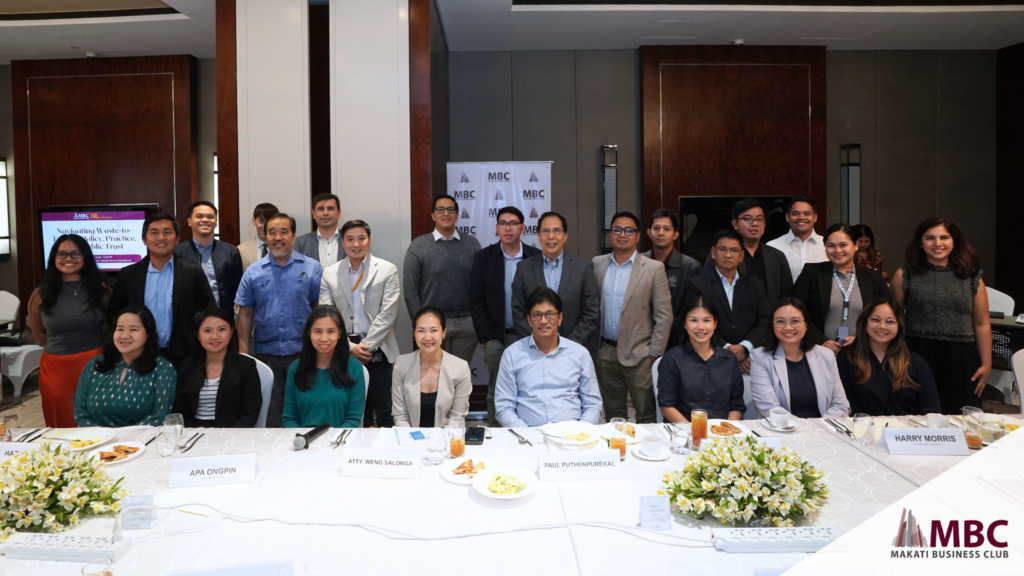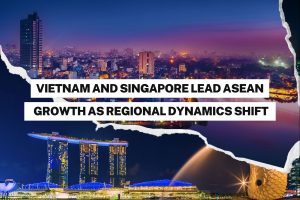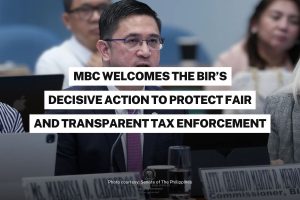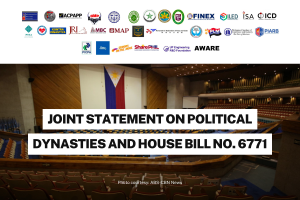Policy Note: MBC Holds Exploratory Roundtable Discussions on Waste to Energy in the Philippines

26 May 2025 – MBC, in partnership with the Embassy of the Netherlands in the Philippines, brought together local stakeholders and Dutch waste-to-energy (WTE) experts to confront the pressing challenges and opportunities for WTE development in the Philippines.
The discussion was moderated by Atty. Rowena Salonga of Puyat, Jacinto and Santos Law alongside technical specialists Hans Breukelman and Luuk Rietvelt who kept the discussion informed and grounded in implementation realities.
The consensus was clear: the private sector is interested in investing in WTE but is hindered by inconsistencies in policies and regulations as well as a lack of clarity in the dynamics of government coordination.
Some key points in the discussion were the following:
- Reliable waste supply is a primary concern for WTE facilities. Waste-to-energy facilities require a steady volume of waste—known as feedstock—to function efficiently. However, because municipal solid waste management is devolved to local government units (LGUs), making collection and segregation practices complicated due to political risk and management issues surrounding waste ownership and disposal.
- Private sector investors often prefer dealing with industrial or agricultural waste rather than municipal solid waste (MSW). In order to mitigate the politicization of MSW and feedstock supply risk from municipalities, investors prefer partnering with stakeholders who are able to provide a more secure and consistent waste stream. Successful WTE projects typically hinge on strong partnerships that explicitly guarantee reliable feedstock supply.
- Market conditions, particularly low tipping fees, discourage investment in formal waste management systems. In many areas, tipping fees—the fees paid to waste facilities for accepting and processing garbage—are set very low. The presence of unregulated and informal dumpsites and low tipping fees make it difficult for legitimate WTE projects to compete, as they face high operational costs without a level playing field.
- Financial viability is impacted by the existing electricity market structure. Current electricity pricing structures are often not attractive enough to support the high upfront costs of WTE projects. Furthermore, there is uncertainty regarding the guaranteed dispatch of electricity produced by WTE facilities to the power grid, meaning operators face uncertainty about power purchase and use. A solid Power Purchase Agreement (PPA) is deemed necessary from a developer’s perspective, as lack of proper backing results in unacceptably high developer risk.
- The absence of a clear national plan for WTE development leads to scattered and unscaled efforts. A coordinated framework is needed to guide project location, cost, and agency responsibilities, addressing the lack of alignment between government bodies like the Department of Energy (DOE) and the Department of Environment and Natural Resources (DENR). There is a need for harmonization between DOE and DENR regarding the categorization of waste and energy. The government needs to see both waste management and power generation as equally valued aspects of WTE.
- Clustering neighboring LGUs into a consortium is proposed as a solution to ensure a stable feedstock supply. This cluster-based approach would make the consortium responsible for providing the feedstock. It allows smaller LGUs to benefit from economies of scale and makes projects more viable for public and private partners
We welcome more participation in our sustainability agenda. If you are interested in knowing more of this initiative, contact our Sustainability Lead, Eunice Tanilon, at eunice.tanilon@mbc.com.ph and our Sustainability Project Officer danii.nepomuceno@mbc.com.ph
Attendees:
Bounty – James Miralles
Business for Sustainable Development – Arvi Perez
Climargy – Alexander Ablaza
Concreat Holdings – Engr. Rowell Peñaflor
Concreat Holdings – Jaecel Llarena
Engie Services Philippines – Jean Baptiste Dreanic
Geocycle (HOLCIM) – Hazel Tamayo
HOLCIM – Nathalie C. Inductivo
Manila Water Company Inc – Mark Gil Verzola
Manila Water Company Inc – Sarah Bergado
Maynilad – Atty. Roel S. Espiritu
Metpower Venture Partners Holdings Inc. – Jonji P. Madara
National Grid Corporation of the Philippines (NGCP) – Christian Paul D. Dapiaoen
National Grid Corporation of the Philippines (NGCP) – Oliver Neil Macaraeg
Navegar – Ayo Camara
Prime Infrastructure – Cara Peralta
Prime Infrastructure – Paul Puthenpurekal
Shell Philippines – Stanley Siahetiong

ASEAN 6 GDP: Vietnam And Singapore Lead ASEAN Growth As Regional Dynamics Shift
ASEAN 6 GDP: Vietnam And Singapore Lead ASEAN Growth As Regional Dynamics Shift Country Q1 Q2 Q3 Q4 2025 Indonesia 4.87 5.12 5.04 5.39 5.11

MBC Welcomes the BIR’s Decisive Action to Protect Fair and Transparent Tax Enforcement
MBC Welcomes the BIR’s Decisive Action to Protect Fair and Transparent Tax Enforcement 24 February 2026 – The Makati Business Club commends Bureau of Internal

Joint Statement on Political Dynasties and House Bill No. 6771
Joint Statement on Political Dynasties and House Bill No. 6771 13 February 2026 – The absence of an effective Anti-Dynasty Law has allowed political power
